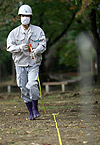
Report
by winifred birdThe Japanese government is launching a large-scale cleanup of the fields, forests, and villages contaminated by the Fukushima nuclear disaster. But some experts caution that an overly aggressive remediation program could create a host of other environmental problems.
Comments | READ MORE
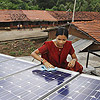
Opinion
by carl popeMore than a billion people worldwide lack access to electricity. The best way to bring it to them — while reducing greenhouse gas emissions — is to launch a global initiative to provide solar panels and other forms of distributed renewable power to poor villages and neighborhoods.
Comments | READ MORE

Report
by john mcquaidWarming temperatures associated with climate change are already affecting vineyards from France to Chile, often in beneficial ways. But as the world continues to warm, some traditional winemaking regions are scrambling to adapt, while other areas see themselves as new wine frontiers.
Comments | READ MORE
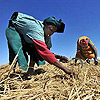
Report
by fred pearceOne idea promoted at the Durban talks was “climate-smart agriculture," which could make crops less vulnerable to heat and drought and turn depleted soils into carbon sinks. The World Bank and African leaders are backing this new approach, but some critics are skeptical that it will benefit small-scale African farmers.
Comments | READ MORE

Opinion
by richard dennissThe Australian government will begin imposing a tax on carbon emissions in mid-2012. But large giveaways to industry mean Australia’s scheme doesn’t go nearly far enough in reducing the nation’s CO2 emissions or providing economic stimulus.
Comments | READ MORE
e360 Video Report
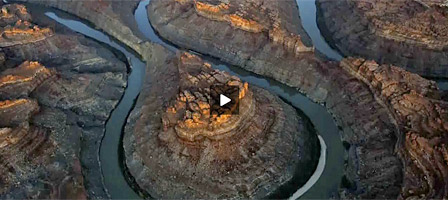
Photographer Pete McBride traveled along the Colorado River from its source high in the Rockies to its historic mouth at the Sea of Cortez. In a
Yale Environment 360 video, he documents how increasing water demands have transformed the river that is the lifeblood for an arid Southwest.
Watch the video

Analysis
by fred pearceA new study finds that Britons are consuming less than they did a decade ago, with similar patterns being seen across Europe. Could this be the beginning of a trend in developed countries? Might we be reaching “peak stuff”?
Comments | READ MORE

Report
by jeremy hanceScientists and conservationists are increasingly relying on heat- and motion-activated camera traps to study rare or reclusive species in remote habitats. And the striking images they provide are proving to be a boon for raising conservation awareness worldwide.
Comments | READ MORE

Opinion
by gernot wagnerSome U.S. politicians have been attacking environmental regulations, arguing that they hurt the economy and that the costs outweigh the benefits. But four decades of data refute that claim and show we need not choose between a clean environment and economic growth.
Comments | READ MORE

Interview: Putting a Price
On the Real Value of Nature
How do you put a price on the value of nature? That’s the question Indian banker Pavan Sukhdev and

Pavan Sukhdev
his colleagues are seeking to answer in their international project on The Economics of Ecosystems and Biodiversity (TEEB), which published
its latest report last month. The challenge, as Sukhdev sees it, is how to address the “economic invisibility of nature.” In an interview with
Yale Environment 360, he cited crucial benefits from nature that are often overlooked, including the capacity of wetlands for filtering water, the role of forests in preventing erosion and flooding, and the importance of bees in pollinating crops. “When did the bees last send you an invoice for pollination?” he asks.
Read the interviewA new study says that a warming climate is having a more profound effect on the world’s mountain vegetation than previously believed and that
some alpine meadows could vanish altogetherwithin a few
View photos

Harald Pauli
The alpine species Nevadensia purpurea
decades. After comparing vegetation samples from 60 mountain summits in 13 European nations — collected in 2001 and then again in 2008 — a team of scientists found that cold-loving plants are being pushed out by plants that thrive in warmer temperatures. While earlier studies have made this conclusion at regional levels, researchers say this is the first time the phenomenon has been shown on a continental scale. And they say it is happening more quickly than expected. “Many cold-loving species are literally running out of mountain,” said Michael Gottfried, a researcher with the Austria-based
Global Observation Research Initiative in Alpine Environments, which coordinated the study, which was published in the journal
Nature Climate Change.
For the first time ever, the U.S. this year
will impose catch limits for all 528 federally managed species, a new policy one official said will become
an “international guidepost” for sustainable fisheries practices. After years of political wrangling, a coalition of lawmakers, environmental groups, fishing groups, and scientists were able to insert language into a reauthorized version of the Magnuson-Stevens Act — which governs all U.S. fishing — that will include annual limits on all fish stocks by the time the 2012 fishing year begins for all species. Some species, including mahi-mahi and wahoo, will have catch limits for the first time. “This simple but enormously powerful provision has eluded lawmakers for years and is probably the most important conservation statute ever enacted into America’s fisheries law,” Joshua Reichert, managing director of the Pew Environment Group, told
The Washington Post. Because the new limits were achieved in cooperation with regional fisheries councils, advocates predict a greater probability of success.
Interview: Development Expert
Relies On Resilience of Villagers
Geographer Edward Carr has spent much of his time working in sub-Saharan Africa, where climate change and other environmental threats present a growing

Edward Carr
challenge to the local people. In an interview with
Yale Environment 360, he describes how his experience in Ghana taught him that villagers were “repositories of information about how to improve the human condition cheaply and with minimal environmental impact.” Carr contends that any outside aid, including funds for adapting to a warming world, must build on this inherent resilience. “One of the most important and fascinating things that comes out of my experience,” says Carr, “is that people are enormously capable with access to very limited resources, while managing serious economic and environmental instability.”
Read the interviewRenewable sources of energy
provided a greater share of U.S. domestic energy production than nuclear during the first nine months of 2011, according to a new report by the U.S. Energy Information Administration (EIA). In its latest
monthly energy review, the EIA reports that renewable energy — including solar, wind, hydropower, geothermal, and biomass/biofuels — provided 11.95 percent of energy production during the first three-quarters of 2011, compared with 10.62 percent from nuclear. During the same period in 2010, about 10.85 percent of domestic energy production came from renewables; in 2009, it was 10.33 percent. Among renewable sources, hydropower produced the largest contribution of total domestic energy, with 4.35 percent, followed by biomass (3.15 percent) and biofuels (2.57 percent). In the electricity sector, renewable sources provided 12.73 percent of net electrical generation in the U.S., according to the report.
A new study says that thinning sea ice in the north Atlantic
has caused a catastrophic decline in harp seal populations, a trend animal advocacy groups say should

Wikimedia
Seal pup
spur an end to commercial hunts of the animal in Canada. According to the study, conducted by scientists at Duke University and the International Fund for Animal Welfare, sea ice cover in all harp seal breeding regions has declined by as much as 6 percent per decade since 1979. Since female seal pups depend on stable winter ice to give birth and nurse their young, these changing conditions have produced a higher mortality, said David Johnston of the Duke University Marine Laboratory and lead author of the study, which was
published in the journal PLoS ONE. “Entire year classes may be disappearing from the population in low ice years” Johnston said. “Essentially all of the pups die.” According to Canada’s Fisheries and Oceans department, as many as 80 percent of seal pups born in 2011 may have died because of a lack of sea ice.

Yale Environment 360 is
a publication of the
Yale School of Forestry
& Environmental Studies.

Twitter: YaleE360
e360 on Facebook
Donate to e360
View mobile site
Bookmark
Share e360
Email newsletter
Subscribe to our feed:

About e360
Contact
Submission Guidelines
Reprints
Opinion
Reports
Analysis
Interviews
e360 Digest
Video Reports
Biodiversity
Business & Innovation
Climate
Energy
Forests
Oceans
Policy & Politics
Pollution & Health
Science & Technology
Sustainability
Urbanization
Water
Antarctica and the Arctic
Africa
Asia
Australia
Central & South America
Europe
Middle East
North America
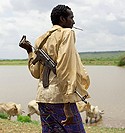
As temperatures rise and water supplies dry up, tribes in East Africa increasingly are coming into conflict. A
Yale Environment 360 video reports on a phenomenon that could become more common: how worsening drought will pit groups — and nations — against one another.
Watch the video.
The latest
from
Yale
Environment 360 is now available for mobile devices at
e360.yale.edu/mobile.
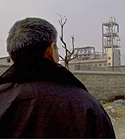 The Warriors of Qiugang
The Warriors of Qiugang, a
Yale Environment 360 video that chronicles the story of a Chinese village’s fight against a polluting chemical plant, was nominated for a 2011 Academy Award for Best Documentary (Short Subject).
Watch the trailer.

Top Image: aerial view of
Iceland. © Google & TerraMetrics.
 Leveling Appalachia: The Legacy of Mountaintop Removal Mining
Leveling Appalachia: The Legacy of Mountaintop Removal Mining, an e360 video examining the environmental and human impacts of this mining practice, won the award for best video in the 2010
National Magazine Awards for Digital Media.
Watch the video.












 Pavan Sukhdev
Pavan Sukhdev

 Edward Carr
Edward Carr








